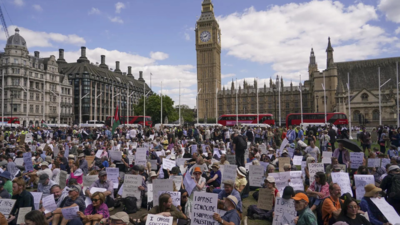American activists are opposing the proposed Dignity Act of 2025, introduced by Rep. Maria Elvira Salazar (Republican) and Rep. Veronica Escobar (Democrat), as one of its provisions includes a payment of $ 20,000 to fast-track green card applications for those who have waited over ten years already. For applicants in family-based or employment-based green card queues who have waited over 10 years, the bill proposes a $20,000 fee to expedite their application and bypass the usual backlog. This fast-track option is intended to cap wait times and help clear the immigration backlog by 2035 The legislation aims to reduce the maximum waiting period for green cards and eliminate the backlog within the next decade. It also raises the per-country cap for both family- and employment-based green cards from 7% to 15%, helping ease delays for applicants from countries like India and China. Another provision says children of long-term visa holders who have lived lawfully in the US for at least 10 cumulative years would be eligible to apply for lawful permanent resident status, protecting them from ageing out.The Act also includes changes like introducing dual-intent F-1 student visas, requiring OPT students to pay Social Security and Medicare taxes, excluding derivative family members from visa caps, expanding O-visa eligibility for STEM and medical doctoral graduates, and allocating $3.6 billion to streamline immigration processing.
What is the Dignity Act?
The Dignity Act of 2025 is a bipartisan US immigration reform bill aimed at modernizing the system, reducing green card backlogs, and addressing the status of both legal and undocumented immigrants. Key provisions include a $20,000 premium processing option for family- and employment-based green card applicants who have waited over 10 years, with the goal of eliminating the backlog by 2035. The bill raises per-country green card caps from 7% to 15%, offers a pathway to permanent residency for “Documented Dreamers” who have lived lawfully in the U.S. for at least a decade, introduces dual-intent F-1 student visas, subjects OPT students to Social Security and Medicare taxes, and invests $3.6 billion to improve immigration processing. It combines border security measures with expanded legal immigration pathways, making it one of the most comprehensive proposals currently under consideration.






